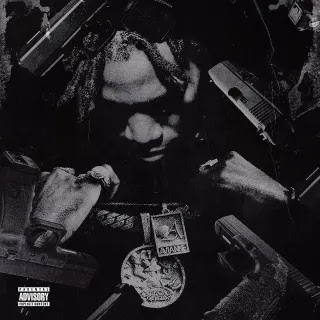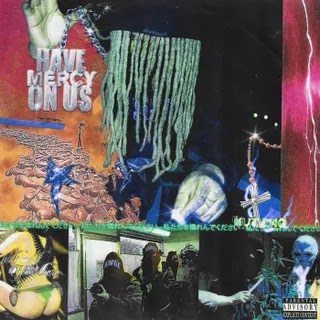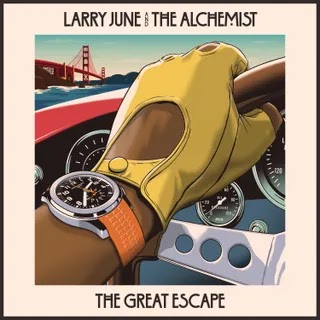On their first album since member Stepa J. Groggs’ death, the Phoenix rap trio reintroduces themselves as wide-eyed explorers, a rep that suits their fascination with rap’s mechanics, its margins, and its future.
Across nearly 19 minutes, Isaac Hayes’ cover of Jimmy Webb’s “By the Time I Get to Phoenix” expands Webb’s lovelorn tale into a soul epic, dilating the original’s neat pop structure into a smoldering haze. On their first album following the death of member Stepa J. Groggs, Injury Reserve channels the spirit of Hayes’ remake, stretching their signature noise rap into freeform thickets of texture and tension. Shunning form and legibility, the Arizona group fully embraces the noise, trip-hop, and post-rock influences that loitered on the fringes of their past work.
The keystone for By the Time I Get to Phoenix is an improvised DJ set Injury Reserve performed on tour in 2019. Building on a recording of that set, the group wrote the album early in the pandemic, mostly completing it by the time Stepa died in late June 2020. This more performance-driven approach—less “Let’s make a weird rap song,” and more “Let’s create”—completely rewires their songwriting. The songs are immediate and intuitive, brimming with personality and ideas.
Ritchie With a T’s manic verse on opener “Outside” is an anxious stream of stutters, gasps, and chants that bob across a drumless void of sirens, keys, and distorted voices. Rhymes are scant, but his performance is engaging, the lack of percussion accenting his subtly metered flows. “What’s the elephant in the room?/Let’s talk to ’em,” he says, a line that could be a wink or just a transcription of his thoughts. When the drums appear nearly four minutes in, they’re the coda to the verse, not its foundation.
“Ground Zero” takes a different approach. The drums fade out midway through as Ritchie jabbers about touchdowns, iced out jewelry, and Anquan Boldin routes. In the past, Injury Reserve’s outsized eccentricity could scan as a gimmick, with Stepa and Ritchie’s everyman rapping oversold by producer Parker Corey’s oddball beats. The mood here is loose and exploratory rather than declarative, the trio never planting their feet. They feel uninhibited.
Ratking and Standing on the Corner come to mind as Ritchie, who provides most of the vocals, raps, sings, and growls over Parker’s shifting arrangements. But where those groups situated their restlessness in the palpable energy and voices of a cityscape, Injury Reserve often evokes the intangible. Stepa’s verse on “Footwork in a Forest Fire” is pure disorientation. “There’s panic in the sky/Even when it’s down below/There’s nowhere to go/You better run and hide,” he raps, his directions a koan. “Top Picks for You” is similarly abstract. “Your blood run through this home/And your habits through much after/Grab the remote, pops up something you would’a watched/I’m like, ‘Classic,’” Ritchie raps, adopting increasingly disembodied language—blood, habits, a remote control, a television show—to describe a departed loved one. Throughout Phoenix, images and sounds dissolve and flicker in this way, quicksand in a dust bowl.
It’s a testament to Corey’s production that the record maintains a center as it constantly unspools. Whereas his past beats could turn overstuffed (“All This Money”) or needlessly outré and showy (“GTFU,” “Eeny Meeny Miny Moe”), here, he’s more hands-off, emphasizing atmosphere. “Smoke Don’t Clear” has some of the most understated drum programming of his catalog, its thick, dubby bassline guiding Ritchie’s theatrical whispers. Both “Knees” and “Superman That” are built around jagged guitar and drum loops that create crags of rhythm and melody. It doesn’t feel accidental that Zeroh, noted unifier of disparate sounds, mixed this. Even when it grows muddled, the album invites immersion.
Injury Reserve’s reputation as a group for people who aren’t rap fans has always been overstated. But like many alt-rap acts, they lacked self-possession, their style defined more by their eclectic posturing than their vision. On By the Time I Get to Phoenix, they reintroduce themselves as wide-eyed explorers, a rep that suits their fascination with rap’s mechanics, its margins, and its future.
















How do you choose the best choose the best product among the ones listed here? Best Acoustic Electric Guitar
ReplyDelete